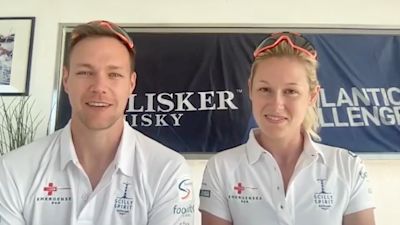From A&E to the sea: The Devon doctors swapping scrubs for oars in 'world's toughest rowing race'

Watch Claire Manning's report
A couple from Exeter have set themselves the ultimate endurance test by attempting to become the first married couple to cross the Atlantic in a rowing race.
Charlie Fleury and Adam Baker are both doctors and work in the A&E department at the Royal Devon and Exeter Hospital.
But for the next seven weeks, they will be swapping their scrubs for rowing gear as they attempt to row a 3,000-mile journey together.
They are taking part in the Talisker Whiskey Atlantic Challenge, which will see them attempt to row from the Canary Islands to the Caribbean in around 40 days.
The boat in which they are competing - called ‘Percy’ - is just 24ft long and their sleeping cabin is roughly the third of the size of a red phone box.
They are the first married couple ever to compete in the race.
"I think personally it gives us a bit of an advantage," Adam said.
"We are already quite aware of how we can get the best out of each other and also perhaps more importantly what pushes each other’s buttons.
"We have arguments and we can get through that, whereas some of the other teams won’t have had an argument yet.
"I think that gives us the edge, that we can have disagreements but then move on and still function as an effective team.”
Charlie and Adam say their day jobs as A&E doctors has prepared them for the pressures of the race.
“There are quite a few parallels between our job and with the row," Charlie said.
"You do have the shift changes, the constant sleep deprivation, the eating little and often rather than a set pattern of meal times and then also the risk and the responsibility.”
The longest the couple have ever rowed together is five days - but the race is expected to take them six to seven weeks.
One of the reasons they have decided to compete is to test emerging research which suggests females often out perform males over extreme distances.
The couple are hoping to examine the differing affects on their own bodies - both physically and psychologically - before, during and after the ultra-endurance event.
Charlie said: “More and more evidence is coming to light that women may fatigue less than men, and therefore be a little bit better in these ultra-endurance events.
"But there is so little evidence out there, it is all collected the majority of the time in laboratories rather than in real time data in live conditions.”
Adam, who suffers from sea sickness, says it was his wife’s idea to take on the challenge which will see them each row unaided 24 hours a day - swapping every two hours.
“We’ve got all our survival kit on board, we’ve got medical kits, life-rafts, we’ve prepared for the worst and prepared to potentially be in a life raft if something bad happened for a couple of days before being picked up by any help.”
A total of 36 teams from around the world compete in the race.
Charlie and Adam hope to raise around £100,000 for Devon Air Ambulance, the RD&E charity, the RNLI and Mind through their efforts.